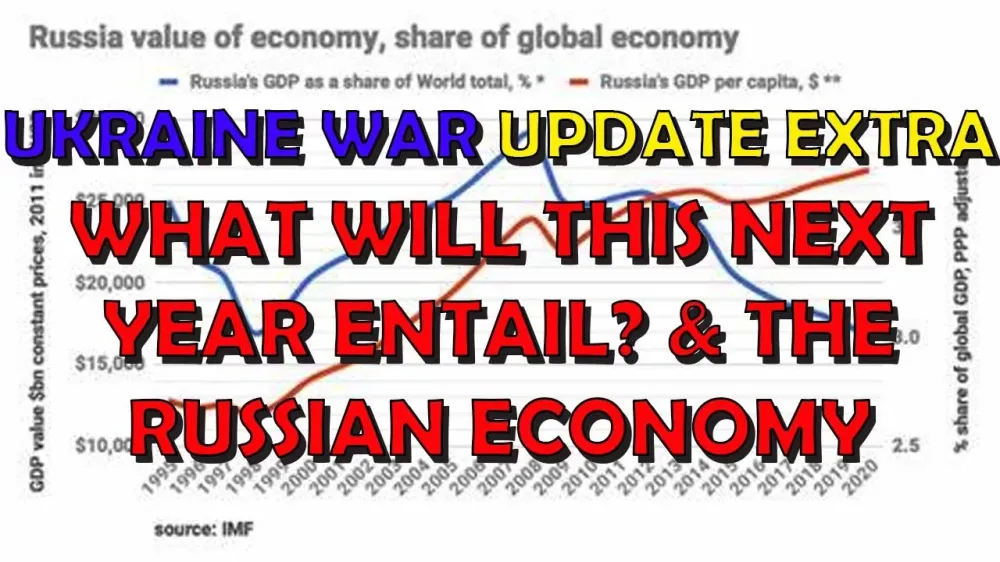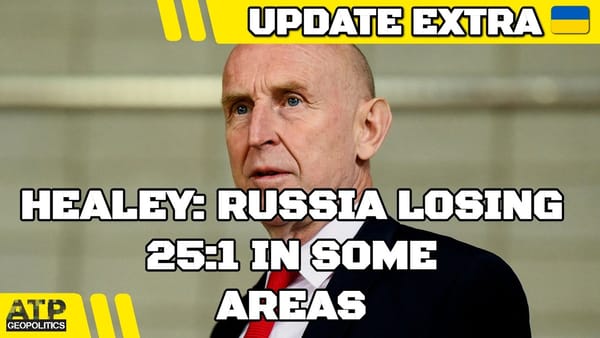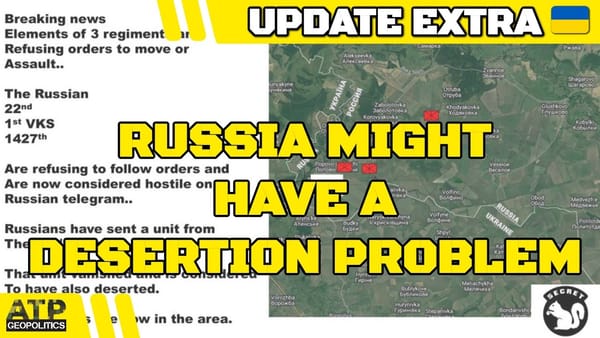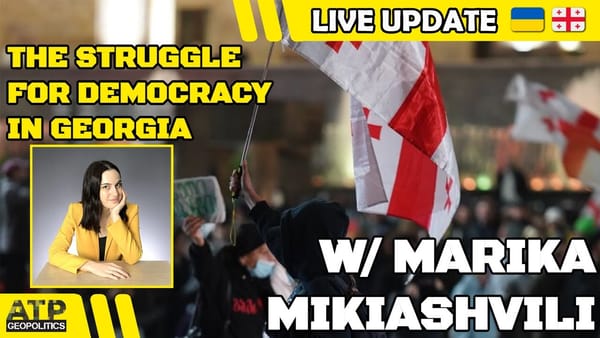Ukraine War Upd. EXTRA: Predicting the Next Year & Russia's Economy
Table of Contents 📖
"Statistical rises in gross domestic product from production of tanks and shells that are blown up in the Donbass... are also far from productive."
Hello Team
🎦 00:00-00:11⏩
Jonathan welcomes viewers to another ATPG update, focusing on the two-year anniversary of the war and its implications, particularly for Russia's economy. He'll be analyzing the strengths and weaknesses of both sides in the coming year.
Return to top⤴️
IMF's revised Russian economic forecast
🎦 00:11-02:08⏩
Jonathan discusses the IMF's recent upward revision of Russia's 2024 growth forecast to 2.6%, double their previous prediction. This is attributed to the war boosting Russia's economy as it operates on a war footing. He emphasizes that the Financial Times article he cites could delve deeper into the implications.
Return to top⤴️
Distortions in GDP figures
🎦 02:08-03:42⏩
Jonathan highlights potential issues with interpreting the IMF's positive forecast. He references a video by Joe Bloggs titled "Ukraine war measures and technology sanctions inflicting long-term damage on the Russian economy." He plays a clip from the IMF where a representative states that Russia's shift to a wartime economy, characterized by high military production and low consumption, resembles the Soviet Union's economic model. The IMF representative warns that the rosy GDP figures mask a bleaker reality, citing the outflow of skilled workers and restricted access to technology due to sanctions.
Return to top⤴️
The illusion of a thriving war economy
🎦 03:42-05:14⏩
Jonathan, echoing Joe Bloggs' analysis, cautions against interpreting Russia's economic figures at face value. While Russia might promote the apparent economic growth, he argues that the reality is far less optimistic. He cites BBC's Faisal Islam, who notes that Russia's reliance on its reserves and increased production creates a deceptive sense of economic security. Jonathan questions the sustainability of using reserves and the true value of a GDP primarily driven by single-use military equipment production.
Return to top⤴️
Negative impacts of a war-focused economy
🎦 05:14-07:20⏩
Jonathan examines the downsides of Russia's wartime economy. He argues that focusing on military production neglects crucial sectors like IT, food technology, and healthcare. The brain drain further exacerbates this issue, as skilled professionals who would have contributed to these sectors have left the country. He contrasts this with a healthy economy where investments in various sectors create a positive feedback loop, ultimately benefiting society and the economy as a whole. He warns that Russia's current path resembles the unsustainable Soviet model, where military production came at the expense of citizens' well-being.
Return to top⤴️
Wage inflation and the impact of the brain drain
🎦 07:20-09:07⏩
Jonathan elaborates on the consequences of the brain drain, noting that the departure of skilled workers not only directly affects the sectors they worked in but also fuels wage inflation. With fewer skilled workers available, employers must offer higher wages to attract talent, particularly in sectors related to the war effort. This, in turn, forces other industries to raise wages to remain competitive, creating an inflationary spiral.
Return to top⤴️
Technology sanctions and the decline of Russian technological innovation
🎦 09:07-10:17⏩
Jonathan shifts focus to the impact of technology sanctions on Russia. He cites the example of Yandex, the Russian equivalent of Google, which was initially Dutch-owned to circumvent sanctions but has since been brought under Russian government control. He argues that Russia's increasing isolation will hinder its ability to compete in the global technology market, limiting its access to talent and hindering innovation. He reiterates that while Russia's GDP might appear healthy due to increased military production, it masks the long-term damage inflicted by sanctions on sectors crucial for a modern economy.
Return to top⤴️
Dependence on hydrocarbons and the impact of US oil production
🎦 10:17-11:14⏩
Jonathan examines Russia's dependence on hydrocarbon revenues, noting the challenges posed by the current oil market. OPEC's efforts to cut production and drive up prices are countered by increased US oil production, which floods the market and keeps prices lower than Russia desires. This situation creates a double blow for Russia, reducing both its production and revenue from oil.
Return to top⤴️
Western strategy: A long-term plan to weaken Russia's economy
🎦 11:14-13:40⏩
Jonathan discusses the Western strategy of targeting Russia's economy through a multi-pronged approach. He cites Faisal Islam's analysis, which highlights that the West aims to restrict Russia's access to technology, increase its production costs, limit its revenues, and ultimately make the conflict economically unsustainable. He emphasizes that while the lack of certain weapons systems for Ukraine is a concern, the West's economic strategy targets Russia's long-term capabilities. This strategy includes limiting the profits Russia gains from oil sales, even to countries like India, through measures like price caps.
Return to top⤴️
Debate over using frozen Russian assets to fund Ukraine's rebuilding
🎦 13:40-15:36⏩
Jonathan delves into the debate surrounding the use of frozen Russian assets, estimated at hundreds of billions of dollars, to fund Ukraine's reconstruction. He notes the support for this move from Ukrainian President Zelenskyy, UK Chancellor Jeremy Hunt, and former UK Prime Minister David Cameron. However, he also acknowledges the unease among central bankers, with one financier warning of the risks associated with "weaponizing the dollar." While a plan is being developed to utilize these assets, Jonathan acknowledges the complexity and potential consequences of such a move.
Return to top⤴️
Anders Puck Nielsen’s long-term outlook
🎦 15:36-18:07⏩
Jonathan introduces the analysis of Anders Puck Nielsen, who compares the long-term trajectories of Russia and Ukraine. While acknowledging Russia's short-term gains in the second year of the war, Jonathan highlights Puck Nielsen's optimism about Ukraine's prospects. He emphasizes that while allies are still ramping up production, their economies have significant room to grow, unlike Russia, which is already operating at capacity.
Return to top⤴️
The advantage of allied economies and their potential
🎦 18:07-19:51⏩
Jonathan delves deeper into the advantages possessed by Ukraine and its allies. He emphasizes the substantial headroom for growth in the combined economic and defense production capabilities of the West. While acknowledging that the current production levels are not ideal, he points to the increasing commitment and production ramp-up as positive signs. This includes a call from Europe to deliver 170,000 artillery rounds to Ukraine by March, demonstrating an improvement in their ability to meet Ukraine's needs. Conversely, Russia, already operating at capacity with limited assistance from China, will struggle to significantly increase its production. He argues that the West's ability to maintain sanctions and leverage their greater economic capacity gives Ukraine a significant advantage in the long run.
Return to top⤴️
Ukraine’s domestic production and challenges with mobilization
🎦 19:51-21:06⏩
Jonathan highlights Ukraine's own growing domestic production capabilities. He mentions the influx of investments from defense companies like Rheinmetall and BAE Systems, which are establishing production facilities within Ukraine. This, he argues, will not only boost Ukraine's war effort but also generate economic activity and provide valuable knowledge transfer. However, he identifies mobilization and maintaining sufficient troop numbers as Ukraine's biggest challenge.
Return to top⤴️
The US stance and potential impact on the war
🎦 21:06-23:55⏩
Jonathan shifts the discussion to the US's role in the conflict. While confident that the Biden administration is more beneficial for Ukraine than a potential Trump administration, he acknowledges the uncertainty surrounding Trump's stance. He analyzes Trump's past statements, suggesting that Trump's primary concern is self-preservation and maintaining a positive image, often at the expense of genuine understanding or commitment. While acknowledging the possibility of Trump continuing to support Ukraine if re-elected, he considers it a 50/50 chance, largely dependent on whether Trump sees it as beneficial for his image.
Return to top⤴️
The importance of the 2024 US elections for Ukraine
🎦 23:55-26:12⏩
Jonathan stresses the importance of the upcoming 2024 US elections for Ukraine's future. He believes that continued Democratic control of the House of Representatives, the Senate, and the Presidency (a "trifecta") would be the most favorable outcome for Ukraine, ensuring continued aid and support.
Return to top⤴️
Potential impact of social issues on the 2024 US elections
🎦 26:12-27:35⏩
Jonathan discusses potential factors that could influence the 2024 US elections and their implications for Ukraine. He highlights the Alabama IVF ruling as a potential turning point, arguing that it could hurt Republicans in the polls. The ruling, which effectively bans IVF in Alabama, stems from a judge's belief that embryos are children and therefore protected. This ruling has sparked bipartisan opposition as IVF is a widely utilized procedure by couples struggling with infertility.
Return to top⤴️
Jonathan's predictions for the next year of the war
🎦 27:35-29:39⏩
Jonathan summarizes his predictions for the upcoming year. He believes that Ukraine will continue to gain an advantageous position compared to Russia in terms of military production, financial stability, and international support. While Russia might experience short-term gains due to its wartime economy, he believes it will ultimately face long-term economic challenges, potentially leading to domestic dissent as the population experiences the downsides of a war-focused economy.
Return to top⤴️
Recommendations and concluding thoughts
🎦 29:39-30:46⏩
Jonathan recommends viewers watch Joe Bloggs' video for a more in-depth analysis of the impact of technology sanctions on the Russian economy. He reiterates his belief that Russia's economic situation is far more precarious than GDP figures suggest and that the country faces the risk of long-term economic stagnation. He ends the video with a thank you to his viewers and patrons for their support.
Return to top⤴️




